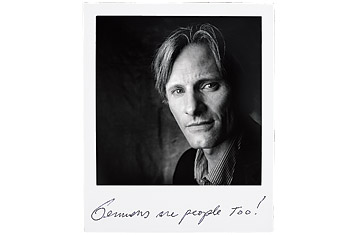
Viggo Mortensen
You're famous for your multilingual talents. Which language are you most comfortable with? A. Patrick Watts MARYVILLE, TENN.
I was raised speaking English and Spanish. And I also speak Danish. And I can get by in French and Italian. I've acted in Spanish and English, but when something has to do with emotions, sometimes I feel I can get to the heart of the matter better in Spanish.
You once said that people should embrace their heritage. What advice would you give to someone born during Nazi-era Germany? Ruth Savoia, LADY LAKE, FLA.
Germans are people too! [Laughs.] I don't remember saying that you should embrace your heritage. I'm not saying that's not true, though. It's a good thing. [Your heritage] is part of who you are.
You've explored poetry, painting, photography and music in addition to acting. Which is your favorite? Arielle Davis, NEW YORK CITY
I don't really separate them. To be an artist, you don't have to compose music or paint or be in the movies or write books. It's just a way of living. It has to do with paying attention, remembering, filtering what you see and answering back, participating in life.
You founded a publishing house for artists who aren't able to publish their works in more traditional venues. Why? Ruth Tam, CHICAGO
It's a way of exploring. In a way, editing is not unlike the movies. The best books, just like the best movies, are a collaboration. They're only as good as the compromise made between the artists involved. I get a real satisfaction from seeing something work as a book.
Many of your films deal with a significant amount of brutality. What's it like to explore violent characters? Frank Pennisi, BAYSIDE, N.Y.
A lot of time the violence expressed onscreen is a metaphor for what's going on inside. I take it seriously, and I respect directors who depict it responsibly. There are a lot of directors who make too much of a joke about it. That lets the audience off the hook.
Would you consider directing? Jeroen Ten Berge WELLINGTON, NEW ZEALAND
I've thought about it a few times. It's a pretty complete world, making movies. It's painting, it's design, it's fashion, it's history, it's philosophy, it's literature, it's photography. It involves so many different ways of expressing yourself.
Some people follow you around the world, attending your exhibitions or screenings. Is that kind of attention flattering or unnerving? Wiecha Lach KRAKOW, POLAND
Both. I'm flattered when there are people from Germany or Japan who will show up when I have a photo exhibition in Iceland. Every once in a while, though, there'll be a person who steps over the line, where they assume that I'm only speaking to them. I worry about them. And sometimes I worry about myself.
In your early 20s, would you have been able to handle the amount of fame you have now? Janice Gherardi NEWBURGH, N.Y.
If I had had a lot of attention early on, I would have gotten tired of the whole circus. I think I would have gotten disenchanted and probably quit.
You kept the horses from Hidalgo and Lord of the Rings. Were you into horses before, or did those films incite a passion? Tom Lanham, SAN FRANCISCO
I grew up with horses when I was a kid in Argentina. I like them. I respect them. I'm careful around them. You never know what they're going to do. They're endlessly interesting. I've had some good acting partners that were horses over the years.
You seem to take serious, dark roles. Have you ever been offered a comedy? Rebecca Richardson BAR HARBOR, MAINE
No. People get used to seeing you do what you've done that's been successful. There's a certain rhythm, a certain timing to comedy, and I envy those who are really good at it. I'd be scared to try an out-and-out comedy. But why not? A little bit of fear is always good.
